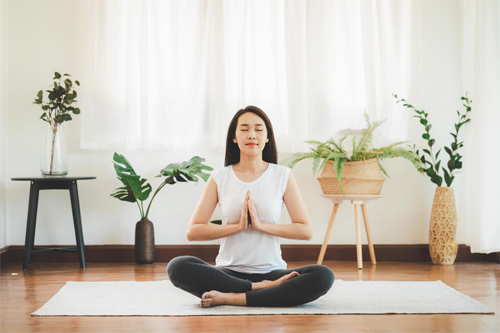How to meditate
Feeling scatterbrained? Stressed-out and overwhelmed? Depressed? It’s time to bring calm in your inner universe. Here are some tips on how to meditate and the benefits you’ll receive from daily meditation.

Warning: Your life might change if you start meditating. Eventually, you may:
– Develop appreciation for the mundane everyday tasks that bore you and keep you joyless.
– No longer be bombarded by the constantly chattering “monkey mind” that’s been taking up residence in your brain.
– Lower your blood pressure; perhaps you’ll be able to stop taking your meds.
– Recognize the illusion of problems your mind spins out of control; learn how to see the hilarity of everyday dramas.
– Attract more positivity in your life. A 2019 study finds that when you meditate, you decrease negative emotions not only in yourself, but also in the people around you.
Can’t sit still for an hour while you’re in a position that seems like you’d strain your groin staying in it for any longer than a minute? Don’t let that dissuade you from giving meditation a try. You don’t have to be like Buddha and sit in perfect lotus pose with your ankles up into your hip sockets. You can be seated in a chair or even lying down on your back staring up at the ceiling or sky.
Meditation doesn’t have to be an impossible spiritual pursuit necessitating pure stillness. You can try moving meditations like tai chi or qigong. Yoga classes can be meditative.
Some people even meditate while they walk. They concentrate on every step and attempt not to get distracted by their own thoughts. Instead, focus is put on the setting, which can be anywhere that’s quiet (even if it’s the garage or laundry room). Anywhere that’s quiet and has natural beauty is a bonus.
Go for a walk and “be in the present,” paying close attention to the rustling of the leaves on a tree or a flock of birds flying overhead. While walking, also focus on the dynamic rhythms of the breath, with stomach and ribs expanding on the inhale and the deflations of the exhalations.
However you decide to meditate, the first baby step – but a very important one on the road to a calmer consciousness and less stressful life – is determining that you are ready for a change in your life. Try telling yourself this: “I’m attracting peace in my life.” But don’t half-heartedly say it. You must truly feel that you’re going to be successful in focusing on the beneficial aspects and calming your inner universe.
If you’re meditating because you heard a friend say it’s good for you, but you have your doubts it will do any good, you’ve already set yourself up for failure to make a powerful, uplifting change in your life.
How long should I meditate?
If you’re new to meditation, try just ten minutes at first, and notice how hard it is to not let your thoughts take over. Remember, the goal of mediation is to focus on your breath. You may also focus on a simple phrase you want to attract in your life – peace, wealth, wellness.
It’s fine if you have thoughts creeping in; Don’t give up at first. So when you notice you are focused on thoughts think of them as passing clouds.
Recognize the fact you’re thinking instead of meditating. Bring yourself back to your breath and phrase/mantra. Try staring at a candle flame. That will really zone your mind out. (Remember staring at campfires? How meditative!)
It won’t be easy, but it’ll be worth it
Very few people who try, say, guitar or surfing for the first time, are any good at it. It will be the same with mediation. Don’t give up. Eventually, try to meditate at least once in the morning and at night for at least 10 minutes. Stick with it and you will profoundly attract more peace in your life.
yogaesoteric
February 21, 2021
